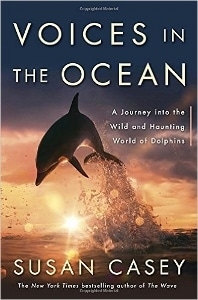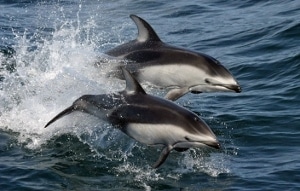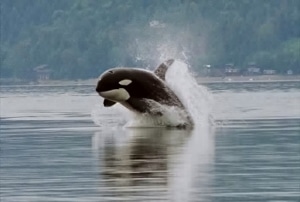Dolphinophilia…
Author: Susan Casey
 What if we’re being watched? Imagine that benevolent aliens have been observing human behavior over the past 200 years. What would they think of us? While they might be impressed occasionally, they would undoubtedly be appalled at how frequently we go about killing each other. But beyond the homicidal atrocities they might be most aggrieved by how poorly we treat the other animals on the planet, particularly the animals that are just as clever and thoughtful as we are. There may be not group that’s both wiser and more persecuted by humans than the marine mammals, particularly dolphins and whales. Seeking out examples of humanity’s persistent – in some instances almost cult-like – fascination with dolphins and contrasting them with some of the most ghastly examples of senseless human cruelty, journalist Susan Casey makes a powerful case for Flipper and his kin in Voices in the Ocean.
What if we’re being watched? Imagine that benevolent aliens have been observing human behavior over the past 200 years. What would they think of us? While they might be impressed occasionally, they would undoubtedly be appalled at how frequently we go about killing each other. But beyond the homicidal atrocities they might be most aggrieved by how poorly we treat the other animals on the planet, particularly the animals that are just as clever and thoughtful as we are. There may be not group that’s both wiser and more persecuted by humans than the marine mammals, particularly dolphins and whales. Seeking out examples of humanity’s persistent – in some instances almost cult-like – fascination with dolphins and contrasting them with some of the most ghastly examples of senseless human cruelty, journalist Susan Casey makes a powerful case for Flipper and his kin in Voices in the Ocean.
With the same fearless attitude she’s displayed in her previous two books – The Devil’s Teeth and The Wave – Casey travels the world in search of dolphins and other toothed whales. Swimming with a friendly pod of spinner dolphins off the coast of Maui and visiting Fungie – the friendly bottlenose dolphin who lives in the harbor of Dingle, Ireland – she reveals secrets about many of the more than thirty species of dolphin that populate all of Earth’s oceans. Considering that the sophisticated dolphin brain has been in existence for more than ten times as long as the human version, Casey is open to the idea that dolphin intelligence may surpass human intelligence in significant and meaningful ways, particularly at a social level. But these eye-opening revelations only make the modern reality that much more painful, as she goes on to spend the rest of the book focusing on how humans have mistreated cetaceans, from displays and shows at marine parks and zoos to frequent slaughters in places like Taiji, Japan and the Solomon Islands. Often placing herself in harm’s way, Casey teams up with noted dolphin rights activist Ric O’Barry – the trainer of the five dolphins used for the Flipper television show – to provide an often horrific view of the some of the vilest behavior one could imagine.
Along the way, Casey manages to befriend countless dolphin fanatics and scientists in her quest, revealing how dolphins and their kin somehow manage to bring out both the purest and darkest sides of human nature. Whether she’s swimming alone in the open ocean or confronting dolphin torturers on their home turf she manages to tell a riveting story full of plenty of well researched facts and thoughtful commentary. As effectively as any nature writer in the business, she has a way of balancing risky – one could say almost foolish – adventures with a peaceful, warmhearted approach to the natural world.
When reading about human history – or simply skimming the front page of any newspaper – it’s not hard to find plenty of reasons to conclude that Homo sapiens is anything but sapient. But I don’t know that I’ve ever read anything that made me more ashamed to be a human than Casey’s vivid descriptions of the many places where these beautiful and sentient beings are treated so horribly. At least the vilest stains in recent human history – like chattel slavery in the United States or the Nazi Holocaust in Europe – are presently recognized as the atrocities that they were. But to this day, the dreadful treatment of dolphins and their kin continues to be defended based on the presumption that these animals are less than human, much as the victims of slavery and genocide were labeled in the past.
Fortunately, Casey holds out hope that life for the world’s dolphins may improve, thanks to widely acclaimed movies like The Cove and Blackfish. Ending her adventure on the island of Crete, where the ancient Minoans – the founders of European civilization – worshiped dolphins four thousand years ago, she reports that the work of dolphin conservationists seems to be making a difference. Featuring passionate and heartrending prose, both inspiring and disturbing, Voices in the Ocean is another powerful addition to Susan Casey’s impressive collection of books about the marine world that we share with so many intriguing creatures. Highly recommended.
— D. Driftless
Orca photo by Minette Layne (CC BY 2.0)
Read our review of The Devil’s Teeth.
- Best Non-Fiction of 2016 - February 1, 2017
- Little Free Library Series — Savannah - May 22, 2015
- Little Free Library Series — Wyoming - November 30, 2014



